
Search
The Renewable Energy site for Do-It-Yourselfers
Bottom-Up Insulating Shades for
Light and Insulation -- Our R8.3 Window
|
The Half Shutter idea,
which provides both good window insulation and also allows daylight
through the window into the room got us to wondering if the same thing
could be accomplished with a thermal shade. Here is a first cut at
trying a top-down/bottom-up shade with side tracks to provide some view,
some day lighting, and some insulation. The nice thing about the
thermal shade is that it gives a nicer look than the Half Shutter.

The shade in the part up mode that allows views and light but does
some insulating on the bottom -- normally it would be up further than
this.
The idea is that when you pull the shade up from the bottom, it
still insulates the bottom part of the window well (like a
Half
Shutter), but it allows both daylight and views out the top part.
It still insulates because the glazing cools the air between the shade
and the window, and that pocket of cool air is stable. If the
shade is pulled over part of the window from the top down, the air
cooled by the glazing simply sinks down along the glazing and pulls in
warm air from the room -- so, the insulating value of the shade is lost
unless the shade is lowered all the way to the bottom.
This shade was also purchased with side tracks (see below) to improve the thermal
performance by reducing air leakage on the sides.
This window also already has a double Mylar inside storm window -- so
clear you can't even see it in the pictures!
|
|
This window is a bit more challenging because it has the triangle top.
To allow the use of a regular shade, I added a horizontal board just at the
bottom of the triangle to support the shade.
The pictures just below show how the top-down/bottom-up shades work.

Shade fully up. |
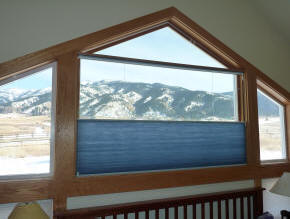
From the bottom up for daylight, view and
insulation. Ideally further up than this
picture shows. |
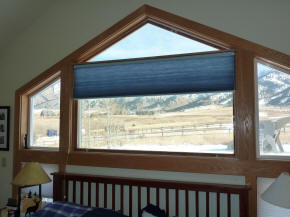
From the top down -- not sure what
one would use this for. |
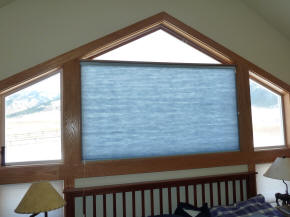
Full shade. |
Side Tracks
This shade has
side
tracks that reduce the leakage air around the sides of the shade.
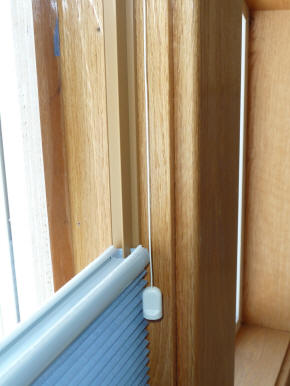
The side track to reduce air leakage. |
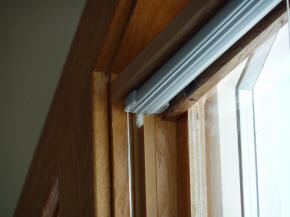
|
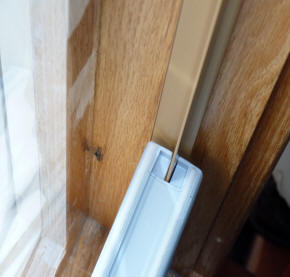
Close-up showing how track engages
the shade. The shade fabric has
a similar notch all the way down. |
The pictures above show the side tracks. The shades have a notch cut
out of the edge of the shade which engages the T shaped track that mounts on the
window frame (see right picture above).
The middle picture also shows the added support board that the window shade is
supported by, and the frame for the double Mylar
inside storm window.
The claim from Symphony Shades is that the double cell shades with the side
tracks add about R3.3 to the window R value. While I do not have any
independent way to verify this value, it does seem about right given the
construction of the shade and the track. For a regular double pane window
(which has an R value around 2), this should cut the heat loss to about 40% of
what it was with just the window.
So, the total R value for this window is about: R3 for the low-e double
glazed window + R2 for the double Mylar inside
storm window + R3.3 for the new shade with side tracks -- for a total of
R8.3!
Using the Insulation Upgrade Calculator, the saving for us is about $31 per
year, or $492 for 10 years with 10% per year fuel price increase. Your
saving may be better or worse depending on your climate and the windows you
have. Since most people will want to have curtains or shades of some type
anyway, the only added cost is to select shades that insulate better and have
the side tracks. Thermal shades may also qualify for federal and/or state
rebates.

This shows the new support board for the shade being added.
We have a similar set of kitchen windows with triangular tops and a set of
old shades that has zero insulating value. We are thinking about using the
same sort of top-down/bottom-up approach on these windows. The fuel saving
will be about $100 per year for the larger area.
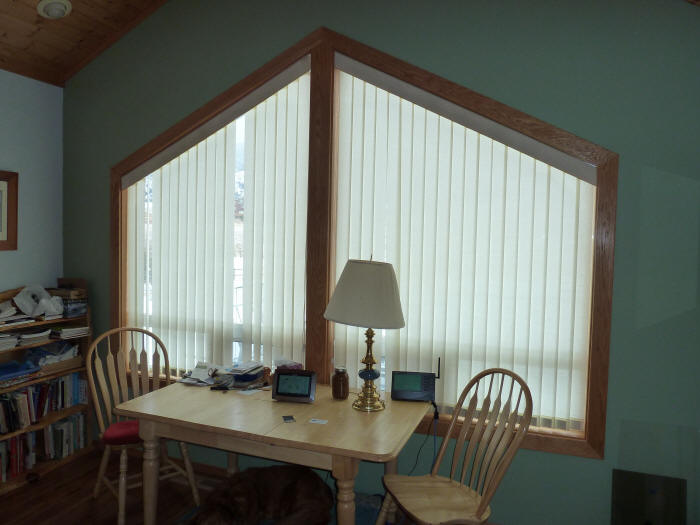
The kitchen windows that are candidates for the top-down/bottom-up insulating
shades.
Gary November 11, 2011
